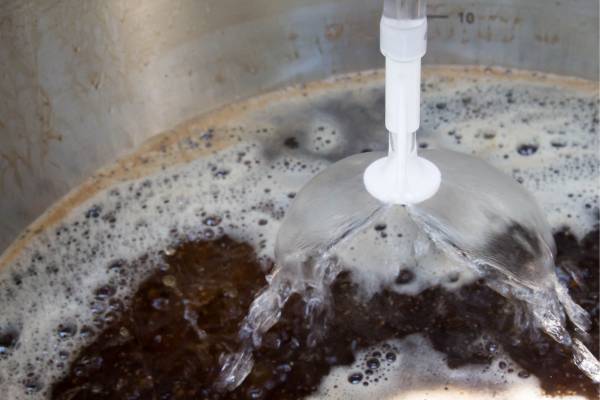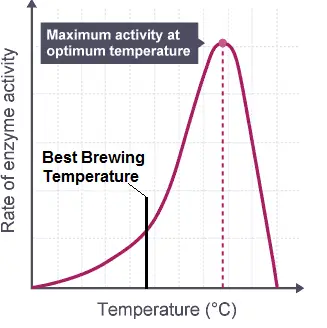As an experienced brewer, I’ve often been asked this question – can you ferment mash too long? While the fermentation process plays a crucial role in determining the taste, alcohol content, and quality of the final product, there is a limit to how long the process should be allowed to continue.
The short answer to whether you can ferment mash too long is yes, you can. Over-fermenting your mash can lead to off-flavors, infection, and other undesirable outcomes.
It’s essential to monitor your fermentation process and follow a proper timeline to ensure a good quality final product.
In this blog post, we will explore the various aspects of fermenting mash and discuss whether fermenting mash for an extended period can be detrimental or advantageous.
1. Understanding the Fermentation Process
The fermentation process is the heart of brewing alcohol, be it beer, wine, or spirits. In simple terms, fermentation is the process where yeast converts sugars present in the mash into alcohol and carbon dioxide.

The type of yeast used, the temperature, and other factors play a vital role in determining how long the fermentation process should last.
1.1. Primary Fermentation
During the primary fermentation phase, yeast consumes the majority of the sugar present in the mash and produces alcohol and carbon dioxide. This phase typically lasts for about 5 to 7 days, depending on the type of yeast and the fermentation temperature. At the end of the primary fermentation, the majority of the yeast will have settled at the bottom of the fermenter.
1.2. Secondary Fermentation
The secondary fermentation phase, also known as conditioning or aging, can last anywhere from a few days to several months, depending on the type of brew being made. During this phase, the yeast consumes any remaining sugars and imparts more complex flavors to the final product.
2. The Importance of Monitoring Fermentation
Closely monitoring the fermentation process is essential to determine when it’s time to move the brew from the primary fermenter to the secondary fermenter, and finally, when to bottle or keg the final product.
A hydrometer or other means of measuring sugars is a crucial tool for monitoring fermentation progress by measuring the specific gravity (density) of the liquid.
As the yeast consumes the sugars, the specific gravity will drop, indicating that the fermentation process is progressing.
3. Risks of Over-Fermenting Mash
There are several risks associated with over-fermenting mash, which can negatively impact the final product.
Some of these risks include:
3.1. Off-Flavors
Over-fermenting the mash can lead to the production of off-flavors in the final product. This can be due to several factors, such as the production of sulfur compounds or the breakdown of amino acids by the yeast. Additionally, yeast can begin to autolyze (break down) if left in the fermenter for too long, releasing unpleasant flavors into the brew.
3.2. Infection
The longer the mash is left to ferment, the higher the chances of infection by wild yeast or bacteria. These infections can ruin the taste of the final product and may even make it unsafe to consume.
3.3. Oxidation
Prolonged fermentation can lead to increased exposure to oxygen, which can lead to oxidation of the brew. Oxidation can cause stale or cardboard-like flavors in the final product and is generally considered undesirable.
4. Knowing When to End Fermentation
Understanding when to end the fermentation process is vital to ensure a good quality final product. In general, it’s essential to follow the guidelines provided by the yeast manufacturer or a trusted recipe. Additionally, regularly monitoring the specific gravity using a hydrometer can help determine the progress of the fermentation process and identify when it’s time to move on to the next step.
5. When Over-Fermentation Can Be Beneficial
In some situations, extended fermentation can be beneficial. For example, some sour beers and wild fermentations can benefit from prolonged fermentation periods, as the slow-acting bacteria and wild yeast strains can impart unique and complex flavors to the brew.
However, these cases are the exception rather than the rule.
6. Balancing Fermentation Time and Quality
Ultimately, the key to successful fermentation is finding the right balance between the time required for the yeast to convert sugars and the potential risks associated with over-fermenting. By closely monitoring the fermentation process and following a proper timeline, brewers can ensure a good quality final product.
7. The Role of Temperature in Fermentation
Temperature plays a crucial role in the fermentation process, as different yeast strains have specific temperature ranges in which they perform optimally.

Fermenting at a higher or lower temperature than recommended can lead to off-flavors and slow or incomplete fermentation.
Maintaining a stable temperature within the optimal range for the chosen yeast strain is essential for a successful fermentation process.
Many of the factors affected by the temperature lies within the yeast and are similar between beer and cider that I wrote about here.
8. The Impact of Yeast Strain on Fermentation Time
Different yeast strains have varying fermentation characteristics and timelines. It’s essential to choose a yeast strain that is suitable for the type of brew being made and follow the manufacturer’s guidelines for fermentation time to ensure a good quality final product.
9. Experimenting with Fermentation Time
While it’s crucial to adhere to proper fermentation timelines, experienced brewers can experiment with different fermentation times to achieve unique flavors and characteristics in their brews. However, it’s essential to approach such experimentation with caution and knowledge of the potential risks associated with over-fermenting.
Conclusion
In conclusion, yes, you can ferment mash too long. Over-fermenting your mash can lead to off-flavors, infection, and other undesirable outcomes. It’s essential to monitor your fermentation process and follow a proper timeline to ensure a good quality final product. Here are ten facts to remember about fermenting mash:
1. Fermentation is the process where yeast converts sugars present in the mash into alcohol and carbon dioxide.
2. Primary fermentation typically lasts for about 5 to 7 days.
3. Secondary fermentation, also known as conditioning or aging, can last anywhere from a few days to several months.
4. A hydrometer is a crucial tool for monitoring fermentation progress.
5. Over-fermenting the mash can lead to the production of off-flavors in the final product.
6. The longer the mash is left to ferment, the higher the chances of infection by wild yeast or bacteria.
7. Oxidation can cause stale or cardboard-like flavors in the final product.
8. In some situations, extended fermentation can be beneficial, such as with sour beers and wild fermentations.
9. Maintaining a stable temperature within the optimal range for the chosen yeast strain is essential for a successful fermentation process.
10. Different yeast strains have varying fermentation characteristics and timelines, so it’s essential to choose a suitable yeast strain for the type of brew being made.
FAQs
How long can you let moonshine mash ferment?
Moonshine mash can be allowed to ferment for 7-10 days, or until the specific gravity reaches around 1.000.
Can corn mash ferment too long?
Yes, corn mash can ferment too long, leading to off-flavors and reduced alcohol yield. It is important to monitor the fermentation process and stop it at the appropriate time to achieve the desired outcome.
How long can you let mash sit before distilling?
Mash should not be left for longer than 48-72 hours before distilling as it can start to spoil and produce off flavors.
How long can you keep fermented mash before distilling?
Fermented mash can be kept for up to a week before distilling, but it is recommended to distill it within 2-3 days for optimal flavor and alcohol yield.
How do you know when corn mash is done fermenting?
Corn mash is typically done fermenting when the bubbling in the airlock has slowed down significantly or stopped altogether, and the specific gravity reading has stabilized for several days in a row.
Can you ferment corn mash for too long?
Yes, you can ferment corn mash for too long. Over-fermentation can result in off-flavors and the production of undesirable compounds. It is important to monitor the fermentation process and stop it at the appropriate time to achieve the desired flavor profile.




